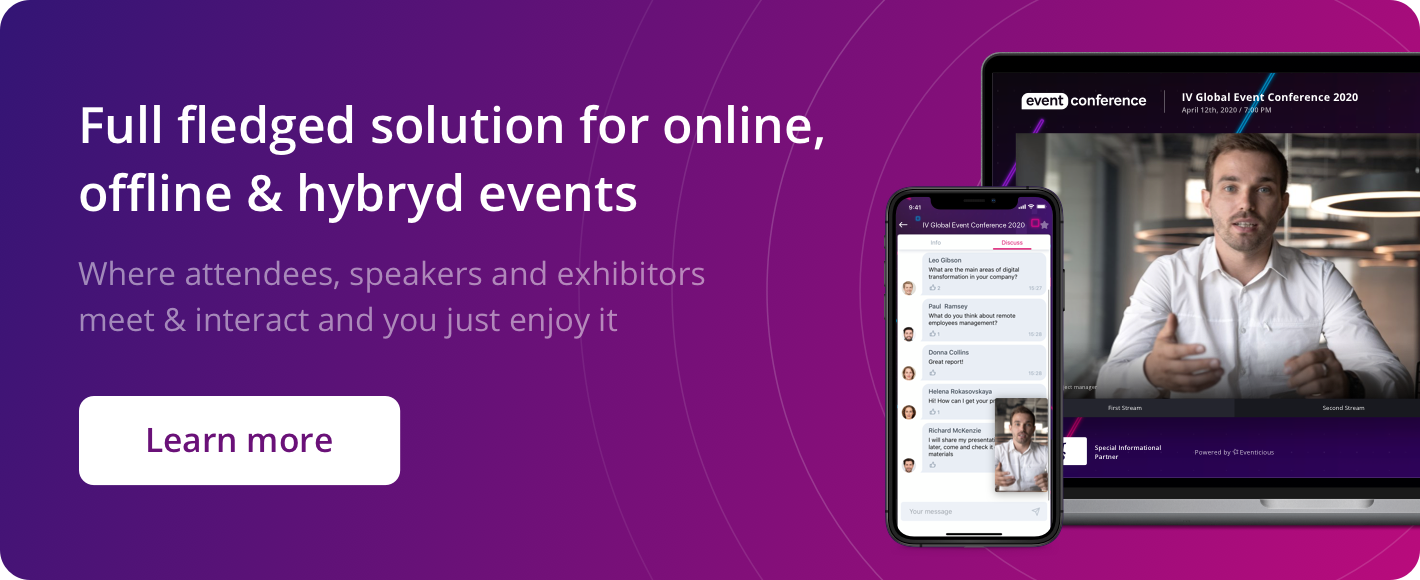The current crisis in the live events industry caused by the COVID-19 outbreak can give birth to a new conference format: a pajama conference, an online event with full immersion and engagement.
The COVID-19 coronavirus outbreak and the resulting panic pose a serious challenge to the events industry. Major conferences and exhibitions are getting cancelled one after another. Until just a short time ago, any event would be proud to achieve international status. Now, amidst the fears that the outbreak may grow into a pandemic, a mere presence of guests from foreign countries will automatically push the event to red alert level.
Tech conferences were among the first to resort to drastic measures. The list of tech conferences that have already been cancelled includes Mobile World Congress in Barcelona, EmTech in Singapore, Shopify in Toronto, Google I/O, and Facebook F8. And these are only some of the most notable ones.
Still, it’s no time to despair. The current situation offers a good opportunity for event planners to take a fresh approach to their events.
Online streaming has been a thing for a while, making it possible to consume content in real time without having to leave one’s home (or quarantine zone). As for other conference perks, such as face-to-face time with industry experts, networking, and idea exchange — well, you have the event technology at your service.
The team behind Eventicious, an event app building service, brainstormed new ways of organizing events in this day and age when face-to-face interaction has become unsafe, and came up with a few ideas on how to make a “pajama conference” a truly useful, immersive and engaging one.
Sessions
Online streaming of presentations should not be a problem. The easiest (but not the only available) option is YouTube live streaming. The live stream can be watched on a TV, on a computer, or in the mobile app. The most convenient way would be to have a mobile app built for your event to provide a schedule of presentations, virtual “rooms” and different streams. This is also the best way to ensure a high level of privacy and to create a virtual venue closed to outsiders.
Isn’t it great that, should you get bored by a speaker, you can instantly move to another “room” to listen to someone else, and it takes only one click? Also, in the app attendees can discuss presentations and ask speakers questions.
Someone posted a clever idea in the discussion? Get to know that person! And there’s no need to search through the crowd: all contacts are here at your fingertips.
Networking
Introverts appreciate event apps because they allow them to quickly scan the entire list of participants and find similarly minded individuals to communicate with.
In the app, attendees can decide for themselves what personal information they want to share, what contacts they prefer to hide, which topics they would like to discuss, what they are looking for, and what they can offer to other attendees.
Handshaking is no longer required for efficient networking!
Exhibition
Brands use conferences and exhibitions to showcase their products. How do you do exhibition stands in pajama format? 3D mapping and VR technologies will come to your help. Automotive brands that were expected to take part in Geneva International Auto Show in Switzerland that was called off this year over coronavirus fears, used VR technology to present their new models.
This can be a good solution for a pajama conference.
An event app can use the smartphone accelerometer to view web pages in 360-degree mode, which gives you a fully functional virtual exhibition.
Engagement
One of the main arguments against online events is low engagement and poor concentration. It’s hard to hold the attention of your audience when you cannot see it.
You can keep your attendees engaged and active by using gamification mechanisms in the event app. Attendees can earn bonus points for being active: asking questions to speakers, completing surveys, posting in themed chats, networking, and participating in sponsored activities.
Collected bonus points can be used as the event currency, for example, to buy event merchandise. Attendees will get something they really like, while organizers will save their budget by reducing overhead. Profit.
One more big advantage of event apps is the ability to send push notifications. For organizers, it can become a great tool for keeping the attendees engaged.
Coffee breaks
Virtual conference attendees would certainly appreciate a delicious cup of coffee and a croissant offered by event organizers. You can partner up with a meal delivery service and surprise your attendees with a coffee break delivered straight to their home.
This partnership can become a great example of organic sponsor integration.
Crowd and atmosphere
Festival-like and “for select few” event atmosphere, which is so much valued by conference attendees, can also be recreated online. Let attendees post photos of themselves viewing presentations and liking each other’s photos, all dressed up in their best pajamas and fluffiest slippers.
You can even organize a pajama contest with sponsored prizes — here’s another sponsor integration for you, one more feather added to your cap. The conference will come to an end, but the chat and the crowd will stay.
Sightseeing
The opportunity to combine business with pleasure and see another city is one more thing about conferences that everybody likes and that can be hard to replicate in the virtual world. Hard, but not impossible.
Many event planners have already started expanding their event apps by adding sections containing descriptions of local attractions, must-visit lists, and links to audio guides.
You can go a step further and add a virtual city tour to your app, which will be broadcast online. To increase engagement, add a quiz, a quest, or any other interactive elements.
It does not look like the novel coronavirus is capable of dealing a mortal blow to the events industry. The outbreak will eventually come to an end, the panic will subside, and people, starved for real human interaction, will be rushing to buy conference and festival tickets. So why not use the current ordeal to investigate new ideas and try out new approaches?



